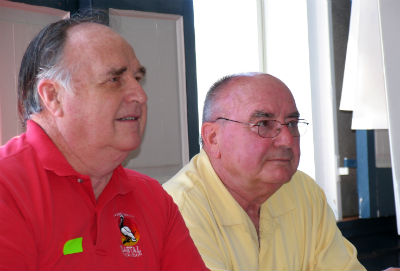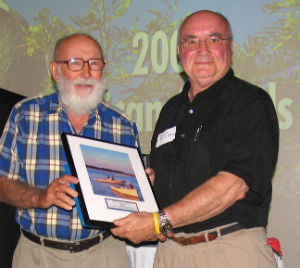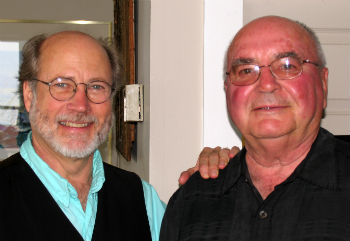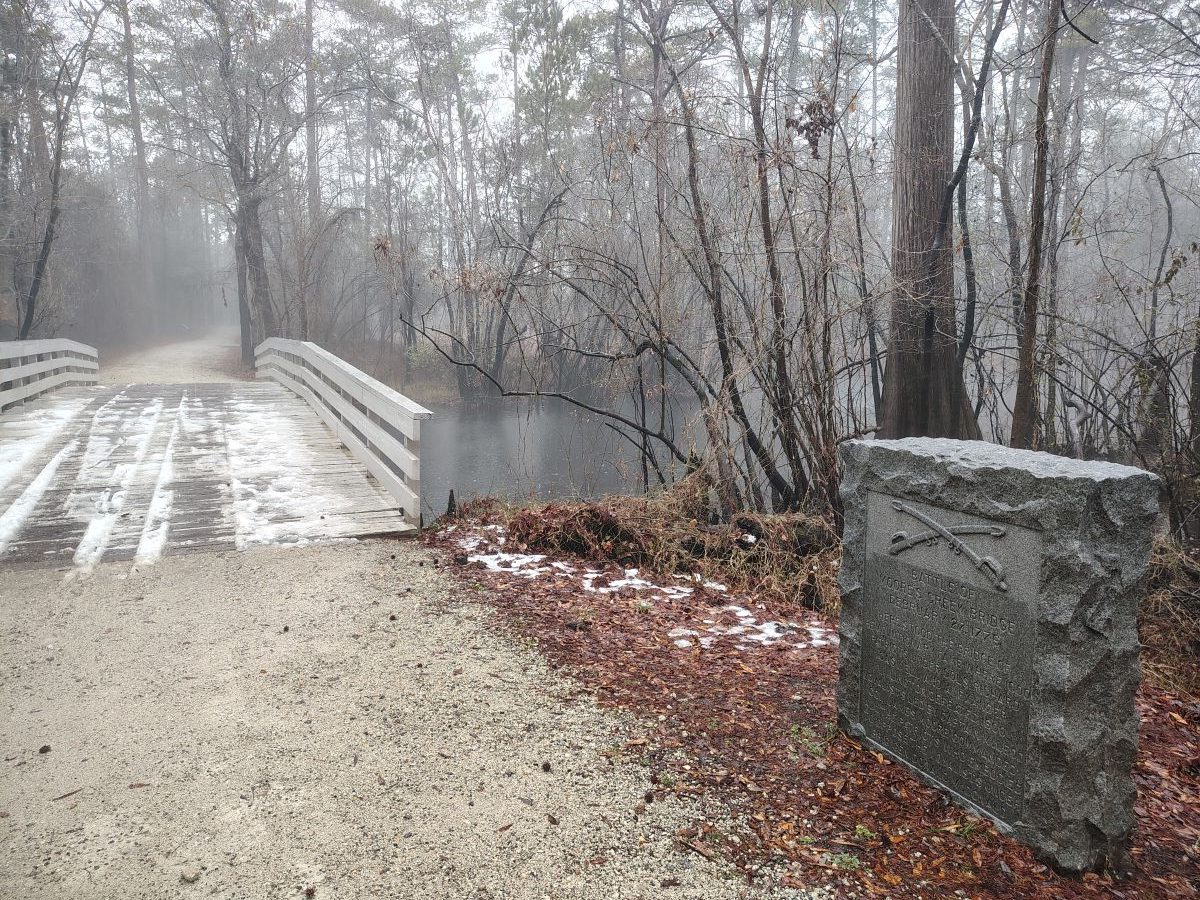MOREHEAD CITY — Decades ago, when Dick Bierly was an executive at IBM in snowy upstate New York, it’s very unlikely it crossed anyone’s mind to ask him if he was, or ever would be, “an environmentalist.”
But, Bierly said recently, reflecting on those days, if anyone had thought to ask such as strange question, his most likely answer would have been, “What’s that?”
Supporter Spotlight
As the president of the board of directors of the N.C. Coastal Federation, Bierly, 81, now knows the answer to his question. And while the question would have seemed strange to Bierly decades ago, how he became an environmentalist isn’t really strange at all. In fact, it’s been a very logical progression, though for Bierly it came rather late in life.
Most environmentalists can relate: He got worried about something, and he got involved. And then he got more involved.
 Dick Bierly, right, took over as president of the the N.C. Coastal Federation when Melvin Shepard, left, retired. |
Life, as John Lennon famously said, “is what happens when you’re busy making other plans.”
Bierly was born in Williamsport, Pa., home of the Little League Baseball World Series. His oldest son, now 54, played in that classic of Americana, and Bierly lived the typical American life of his generation. He went to high school in Endicott, N.Y., then off to college at Champlain, then to St. Lawrence University, where he got a degree in sociology in 1956. Sociology, of course, is the study of human social behavior and its origins. In short, it’s all about people, in all their infinite variations.
Bierly loved people then, loves them now. And he went into personnel with IBM in 1956. He stayed with the company in New York, and then moved – he was its first person onsite – when IBM opened its facility in the Research Triangle Park near Raleigh in 1965.
Supporter Spotlight
“People started telling me I had to go to the coast,” he recalls. “They said it was ‘like New Jersey 60 years ago.’ So I went.”
He and his family took a vacation to Atlantic Beach on the July 4 weekend in 1965 and got a room in the Showboat Motel on the causeway. They were able to book a room only because the motel was brand new; everything else was full, he recalls. Thus began Dick Bierly’s love affair with the coast.
Eventually, he and his wife bought a condo at 8-1/2 Marina Village in Atlantic Beach, which is kind of ironic, because it was built in wetlands, back when nobody cared much about that. The federation’s “No Wetlands, No Seafood” bumper sticker had yet been conceived and placed on countless vehicles around the N.C. coast.
Bierly stayed with IBM and went to Detroit, then to another location just outside Philadelphia. But the Bierlys kept coming to Carteret County and staying in their condo.
When it came time to retire in 1992, they chose to live on the N.C. coast and bought a fine house on Webb Court in Morehead City. It was a beautiful spot, on Spooner’s Creek, one of those gorgeous tidal “cricks” that hardly anyone knows about. Otters, egrets, lots of fish. But developers eventually discovered Spooner’s and one – Bierly doesn’t remember exactly who – decided in 1993 or ’94 that it was a perfect place to put up a bunch of condos and carve out an upland marina on 20 or 30 acres.
“Most of us,” Bierly said, referring to his neighbors, “thought it was overkill. It got pretty emotional.”
That’s when Bierly began doing his research and learning about North Carolina’s Coastal Area Management Act, groundbreaking 1980s legislation designed to keep the state’s coast as pristine as possible.
“I just wanted to get as informed as possible on the rules,” Bierly said. “And Todd came in as a resource for us.”
That was Todd Miller, a local Bogue Sounder who is the founder and head of what was then a young N.C. Coastal Federation. But Miller, while a fierce advocate for coastal protection, is not, unless absolutely necessary, the confrontational type. Although Bierly and his neighbors hired a lawyer, they didn’t jump into a lawsuit. They negotiated. Quietly. It was the kind of thing that appealed to Bierly, the kind of thing, too, that became the hallmark of the federation.
 You’ll often find Dick Bierly handing out the annual Pelican Awards, as he is here to the late Elmer Eddy. |
Eventually, the developer settled for single-family homes, Bierly recalled, and Morehead City annexed the property, which meant it would have city sewer service instead of the septic tanks that can malfunction and foul coastal waters. It wasn’t a slam-dunk win for anybody. It was a compromise that worked.
Bierly, as is his nature, made a lot of friends. One of them, the well-respect scientist Irving Hooper, asked him to join Carteret County Crossroads, a local environmental group. Bierly did, and eventually became its president. He was, whether he knew it or not, an environmentalist.
There’s a lot of overlap between the wholly Carteret-bound Crossroads and the statewide but Carteret-based federation, and in 2002, Miller asked Bierly to become a member of his group’s board of directors. Two quiet, studious guys of different generations, both with a belief in working with, not against, people, if at all possible, hit it off.
“What Dick had done with IBM was personnel,” Miller said recently. “He was a people person. He had always gotten along with a wide variety of people. He’d spent a career dealing with all kinds of people, including executives from Fortune 500 companies.
“He certainly was not a tree-hugging environmentalist,” Miller continued. “He was – and still is – a Republican, which is a bit unusual. But he had something, that ability to connect with and be comfortable with business people, that we needed.”
Eventually, when federation Vice President Pricey Taylor got elected to the state legislature, Bierly moved into that role, under President Melvin Shepard. When Shepard stepped down after about 10 years, Bierly was elected to the top spot last year.
Bierly, Miller said, obviously understood personnel, and he knew that even an environmental organization needed to work on business principles. It had to sustain itself. Miller himself knew that, and that’s one of things that Bierly says impressed him the most about Miller. That and his preternatural calm.
“I have always been impressed by Todd,” Bierly said. “He is an amazing person, very capable. He is good at raising money, and he knows how important it is. The Coastal Federation has grown tremendously, and Todd has run it like a business. There’s planning, from the grassroots on up, and there’s a budget, and he’s a visionary. I was never much of a visionary.”
What Bierly is – other than an environmentalist – is a man who understands nuance and the importance of the balance between business and the environment. He knows his background is unusual for a person in his position and said he’s glad to have “opened some doors” to business people who might not otherwise have been available to work with the federation. Some, he said, don’t always understand.
He was involved about 15 years ago in the Big Rock Blue Marlin Fishing Tournament, an annual Morehead City-based sports fishing contest that started tiny decades ago but has grown to a multimillion dollar behemoth. It gives away hundreds of thousands of dollars to charities and to civic projects, but its reputation, at least in the past, has been more corporate than conservation. Bierly said some of his buddies on the Big Rock board of directors might think the federation is about “no growth,” but he tells them that’s not the case; it’s about managing growth and growing the right way for the coast.
 Dick Bierly, right, and Bland Simpson, an author and UNC professor who serves on the federation board. |
“Here, the environment is our business,” he said. “What we sell is clean water, fishing, research opportunities, education. It’s the engine of the economy, and there has to be a balance. We have to protect what we have. If we don’t have it, what do we have?”
The federation, Bierly believes, has been successful in part because it doesn’t view protecting the coast as an all-or-nothing, zero-sum game.
“We’ve been involved in a few lawsuits, but that’s always been a last resort,” he said. “That comes from the top, from Todd and his top people. We’d rather sit down and talk to people rationally and see if we can come to an agreement. And I think it’s been successful, although sometimes it depends on how you define ‘success.’”
By that, Bierly means you can’t expect to win every battle, and you have to look at what could have happened if the federation had not been around. And you also have to look at how the organization has subtly affected its surroundings, in large part by educating and working with leaders in the towns and communities.
You see the influence in little things, like the rain gardens the federation has helped build at schools and at the town hall in Cedar Point, a small town in western Carteret County. You see it in things like the “greenness” of the new building at Swansboro United Methodist Church and the new Stevenson Toyota dealership in Jacksonville, and in improved site planning and stormwater management at small businesses, even corporate titans like McDonald’s. You see it in the growing number of residential projects built under the state’s voluntary low-impact stormwater runoff standards.
Bierly said you also see the federation’s influence in the mega projects, like the conversion of North River Farms in Down East Carteret County back to wetlands and in the major oyster habitat restoration at Jones Island in Hammocks Beach State Park in Onslow County, which Bierly also noted is home to a wonderful environmental education center. Then there’s the Titan cement plant on the Northeast Cape Fear River outside Wilmington, which has been proposed for six years but is still not built, thanks to grassroots opposition and legal efforts aided by the federation.
Education, Bierly said, is a key to protecting the environment in the future, and the federation is doing that, starting with the youngest of the young. Those rain gardens at schools get elementary-age kids involved, and they take to it like fish in water. And when they get involved, so do the teachers and the parents.
“It (environmental stewardship) isn’t stuffed down people’s throats,” Bierly said. “You just present them a concept that hopefully changes the way they think a little.
“This organization is a real jewel,” he said. “I don’t think I’m going to be president for 10 years, like Melvin was, but I’m very proud to be a part of it.”







